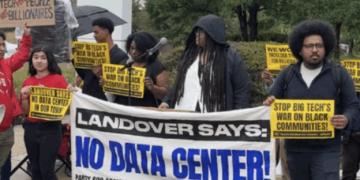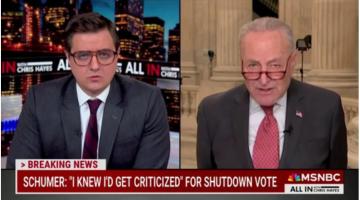The Democratic Party has seemingly accomplished the impossible – a revival of centrism in the midst of its collapse.
“The Republican establishment and the left backing Biden are on an impossible quest to defend institutions that no longer have legitimacy.”
The COVID19 pandemic and global economic crisis are producing huge fractures in the capitalist system's regular operation. Crises produce phenomena like we see today: the political violence, protests, and the growth of socialist and far-right groups; and the shifts in power within the global economic system. Within this crisis, the ruling class may attempt to reconfigure its hegemony through new political alliances and realignments, and new interplays between force and consent. The movement of part of the Republican establishment to Biden and the Democrats should not be looked at as temporary, but instead a representation of changing alliances in the face of this crisis. It should be look at as a reflection of how deep this crisis is.
The “Organic Crisis”
Gramsci used the term ‘organic crisis’ to describe periods where the capitalist system produces a crisis where the ruling class and its system can no longer function as it normally does. The “organic crisis” occurs at all levels of society – economic, social, political and ideological. Because the ruling class cannot resolve the crisis, it challenges the fundamental ideas, values and organizations on which the previous order was maintained.
The Ruling Class Case for Biden
One of the main tasks of the ruling class is to figure out how best to place the cost of the crisis on the backs of ordinary people without arousing their anger. One section of the ruling class sees the Democratic Party and Biden as the last hope of preserving the neoliberal order. Having survived a 'civil war' that first erupted after the failed 2016 presidential campaign, the Party has shown itself able to manage crisis and bring legitimacy back to the system. With Biden as the nominee and the establishment still retaining their leadership, the Democratic Party has seemingly accomplished the impossible – a revival of centrism in the midst of its collapse.
The economic crisis and pandemic have exacerbated the ruling class’s fear of a resurgence of labor militancy like in the 1930s and 1960s. The crisis and the potential for an explosion of movements has brought urgent questions about whether the ruling class can govern in the old way or if something new is needed. They hope that Biden will be able to bring a political equilibrium using the concessionary and coercive powers of the state.
“The Party has shown itself able to manage crisis and bring legitimacy back to the system.”
Biden and the Democratic Party, it is hoped, may have enough union and social movement support to give it credibility as the ‘representative of the people’ in this election and throughout crisis. The Democratic Party will hope that the labor and social movement leadership will negotiate bargains and discipline their constituencies to stay within the constraints imposed by the crisis and the interests of key sections of capital.
Biden has received numerous establishment Republican support thus far. At this years' Democratic National Convention for example, more of the establishment than 2016 came out in support of Biden; these included: Cindy McCain, John Kasich, Susan Molinari, Meg Whitman, and Colin Powell.
In addition, Biden received the endorsement of 73 former U.S. national security officials in the Republican administrations, including former heads of the CIA and FBI and former Trump administration officials. With his support in the union and social movements, Biden is the only candidate that can represent a political alternative to one element of their base, and a means to preserve the existing status quo to another. Although cross party endorsements have been common in the last few conventions, the alliances have been temporary.
The 2020 Realignment
When it was evident in 2016 that Trump was the nominee, some delegates and establishment figures like Erick Erickson conspired to block his nomination. Many were concerned about the unrest that his racist scapegoating of immigrants and his history of sexual violence and sexism would cause. Once his nomination was official, about 20% of Republican House members refused to endorse him, and a significant numbers of establishment Republicans rallied around Clinton.
The Republican Party is now the Party of Trump. This didn’t occur out of thin air but out of a battle amongst him and the establishments of both major parties and the different wings within his own party. He has worked to build a cabinet of loyalists and effectively remade the Party into his own. By 2019 Trump built a cabinet of loyalists and won the trust of many that opposed his initial run. This was exemplified by the fact that every Republican member of the House opposed his impeachment.
Also, by 2019, congressional GOP had become more aligned with Trump, as opposition members retired and were replaced by more pro-Trump figures. Since Trump has assumed office, no Republican in the House or Senate has been able to build a bloc within the Party against him – including Senator Romney. As well the 2020 Republican Party is simply Trump’s platform from 2016. Trump has also been able to create favorable legal conditions for his agenda by appointing two Supreme Court Justices (at the time of writing), and 200 other judges at lower federal courts, approximately a quarter of all active federal judges.
“Since Trump has assumed office, no Republican in the House or Senate has been able to build a bloc within the Party against him.”
For the ruling class that supports Trump, he is useful. Trump's discourse avoids naming and placing blame squarely on the capitalist system at the heart of the Great Recession and the austerity regime that gave rise to the anger that brought him into office. Trump, like other populists makes vague promises to various sections of society to win office and once in power, works to secure the position of the ruling elite and old power structure. His discourse whips up sections of the state and mostly middle class into action and violence against counter-movements like the left which is crucial in a period of increasing polarization of wealth and more unequal distribution of wealth and goods.
But the COVID19 pandemic, continued and accelerating crisis of legitimacy, and the dramatic decline of the Post-WW2 global system of governance has begged serious questions of Trump. A section of the ruling class is concerned about the decline of institutions and alliances like North Atlantic Treaty Organization (NATO), United Nations (U.N.), International Monetary Fund (IMF), and other multilateral cooperation that have sustained U.S. global hegemony. Though Trump has continued Obama's Pivot to Asia meant to challenge China's growing military and global influence, Trump has also undermined the alliances thought to be needed to accomplish it.
“A section of the ruling class is concerned about the decline of institutions and alliances like NATO, the UN and the IMF.“
At the same time, to some, Trump simply represents a hyper-realism about the possibility and sustainability of the post-World War 2 international order. Trump reflects a realization of the limits of American power and the domestic frustration of foreign conflicts brought by the wars in Iraq and Afghanistan. The U.S. hegemony since WW2 is built on its monetary dominance, control of international institutions, expanding domestic consumer market, and through its full spectrum dominance (land, sea, air, space and cyber). The 2008/9 crisis exposed the limits of the U.S.'s ability to maintain that structure in the same way.
They are also concerned by the polarization and infights within and amongst governmental and, with COVID, that Trump's decisions reflect a breakdown of normal governance. Trump and his administration along with Democratic leadership were able to inject Wall Street and the rich with huge a stimulus in late March but has strayed away from mainstream capitalist economists and refused to continue negotiations on a second round of stimulus whilst promoting conspiracy theories and misinformation around the virus.
Trump and Authoritarian Populism’s Stable Base
Trump has been able to build a solid base amongst downwardly mobile white working and middle classes. It should be noted that the white working class is not Trump’s only base or even main one. Though for example, neoliberalism was as David Harvey argues a “political project to re-establish the conditions for capital accumulation and to restore the power of economic elites”, it required a new “common sense” and a cross class alliance. Typically, crisis period lay bare the contradictions inherent in capitalist society and more specifically within uneasy coalitions such as Trump’s.
The middle class may feel dominated by banks and sections of big business, and workers may grow angry at the austerity that is a part of the “recovery.” Trump has thus far been able to divert anger about the unequal nature of the stimulus away from himself and to the alleged intransigence of the Democratic Party and to governors that wouldn’t reopen the economy. The nativism Trump embodies was once relegated to a small faction of the Party (paleoconservatives such as Pat Buchanan), but has since been mainstreamed as neoliberalism has devastated their living standards. The nativism, as well as nationalism, acts in a way like W.E.B. Dubois’s “psychological wage” and to maintain the middle class of the base that feels beaten down.
“The nativism Trump embodies has been mainstreamed.”
Trump was able to take so many union votes in 2016 that Hillary Clinton lost Pennsylvania, Wisconsin and Michigan. Despite COVID and massive unemployment, Trump's approval rating has averaged around 40%. By comparison, a CBS News/New York Times poll showed President Bush’s final approval rating was 22%, due to views on the Iraq War and Great Recession. This shows that Trump and his authoritarian populism has a solid base, which could be mobilized.
It should be noted as well that 2016 showed that most of Trump’s supporters were largely affluent Republicans and come from the middle class. This is consistent with most authoritarian populists whose base is typically the middle class, who during times of crisis vacillate between the working class who is engaging in struggle and the capitalist class seeking to restore its order.
Trump was able to capitalize on the disappointment of Obama's failures to deliver on his progressive platform partially by playing on the racism latent in U.S. society. Through theatrics and vague populist statements, Trump imbues the aura of fighting for working people instead of trimming around the edges like Obama. A 2017 Harvard Business Review textual analysis of Trump’s campaign speechesshowed that the word “workers” appeared more frequently than any other word other than “donors”.
“Trump imbues the aura of fighting for working people instead of trimming around the edges like Obama.”
Obama's 2008 "Coalition" was unprecedented because it was built on a new consensus and a new set of alliances that brought in white working-class voters from the Midwest. Even though Obama lost the white working class vote by 18 points, this was a significant improvement over 2004 when they lost them by 23 points.
Many people today forget the astronomical expectations of Obama when got into office. A USA Today/Gallup before the election showed that most Americans believe that Obama would be able to achieve every one of his ten major campaign promises. Because Obama and the Democratic Party weren’t willing to deliver a definitive break from neoliberalism, and the left wasn’t able to present a real political alternative, a year later, the Right were able to begin to gain back seats and lay the basis for right populism.
The Fascist Threat
There are debates today, like in 2016, about whether Trump is simply a right-wing populist, fascist, or traditional Republican. Furthermore, many have looked at whether he has a party apparatus or is an isolated leader. Many of those that are quick to call Trump a “fascist” reject the demands of the workers movement and especially their role in any anti-fascist struggle. For them, the key is securing the prevailing capitalist system through a vote for Biden.
The danger lurking in a crisis period in that if the ruling class is not capable of maintaining power through its normal means, and the working class cannot take power, there is a possibility the emergence of ruling class politics in the form of the far right. As a sign of what can come, Trump administration has egregiously weakened liberal democratic norms by calling for a political assassination and defended a fascist who committed two murders.
The far-right in the form of authoritarian populism or outright fascism requires a crisis that radicalizes all subordinate classes, and a crisis of representation and authority, allowing its leader to speak in a sense "directly to the people" against a corrupt establishment. According to the discourse of authoritarian populists like Trump, the existing institutions subvert the interests of the people and a leader, who reflects the will of the people, is needed to “Make America Great Again.”
The movement from authoritarian populism to fascism as seen in Germany and Italy occurs when there is a socialist movement or, more correctly, the illusion of a strong socialist movement, which is threatening enough to mobilize an anti-socialist movement. It also requires a mass base to draw support from. As well it requires a ruling class convinced that it cannot rule through the existing democratic state apparatus. A September 22 poll from USA TODAY/Ipsos Poll that revealed that roughly 64% percent of respondents believe protesters and counter-protesters are overwhelming American cities should bring concern.
“The Trump administration has egregiously weakened liberal democratic norms.”
But this is a laughable overestimation of the strength of the socialist movement today but one echoed by right wing media, Trump, the Department of Homeland Security and Federal Bureau Investigations (FBI) in particular. Unfortunately, the left enters this crisis in a position of weakness, despite the 2008 and 2016 periods of radicalization that produced the 2018/19 strike wave, massive increases in membership of left groups, a near win for a self-professed "democratic socialist" presidential nominee, and the recent election of several ‘left’ democrats throughout the country.
So far, compared to challenges that this period has brought, the left has not been able to translate those gains into the needed mass movements or independent working class organizations which could be used to shift the balance of power. If Trump and his brand of authoritarian populism has captured the Republican Party it would mean that the right has a powerful tool to beat back any counter-hegemonic movement during this crisis.
The Republican establishment and the left backing Biden are on an impossible quest to defend institutions that no longer have legitimacy. Democrats like AOC are happy to frame the contest as one between ‘fascism’ on one hand and ‘democracy’ on the other. The capitalist economic and political systems are crisis prone and will cause misery and pain in the service of finding a resolution. The huge unemployment rate, skyrocketing sovereign debt, global pandemic and crisis of legitimacy, not to mention the ecological crisis, make it likely that this crisis will be deeper than even 2008.
As we have learned in other periods, things getting worse do not necessarily lead to increases in political struggle and victories for the left. The crisis of the 1970’s brought a neoliberal settlement – a victory for the Right and capital. The threat of fascism today can only be countered by a political strategy. Recognizing that the balance of power is by far stacked against the workers movement, the left must urgently provide the basis for a political alternative. The left must have an answer to this crisis beyond simply defending capitalist institutions from the far right that seeks to remake them.
Ashton Rome is an organizer with Socialist Alternative Bay Area (facebook.com/SABayArea ) and Tenant and Neighborhood Council Bay Area (baytanc.com). Ashton can be reached at Ashton.Rome@protonmail.com . Written in an individual capacity.
COMMENTS?
Please join the conversation on Black Agenda Report's Facebook page at http://facebook.com/blackagendareport
Or, you can comment by emailing us at comments@blackagendareport.com



















